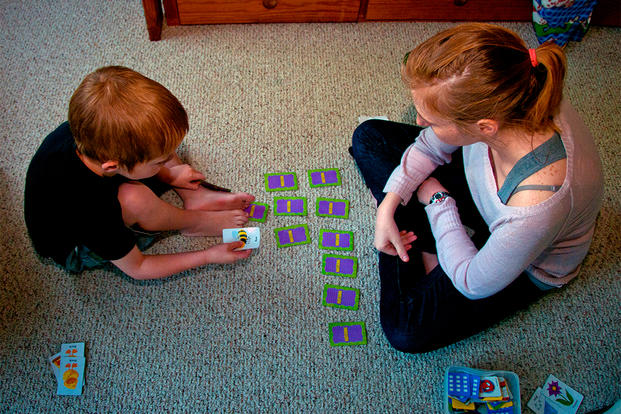When TRICARE this month announced cuts of up to 15 percent next year in fees for applied behavior analysis (ABA) therapy of children with autism, some ABA businesses, in responding to an online survey, said they would stop treating TRICARE clients. Most respondents, however, said they need more time to assess how the reduced rates would affect their services.
Mary Kaye Justis, director of the TRICARE Health Plan, said she doesn't expect the fee cuts to cause a significant shift of providers for the 10,500 military children receiving ABA services. TRICARE reimbursements still will be higher than offered by most commercial health insurance plans, she said.
"We will continue to be a very reasonable payer," Justis said. "We may not be the best payer in the country but we certainly have the most comprehensive benefit."
ABA therapists work with children, often in their homes, to increase or decrease targeted behaviors and to help them acquire language, daily living or play skills. It also can involve intensive behavioral interventions. TRICARE coverage of ABA therapy has been among the best in the country with no age limits on children treated and no caps on total TRICARE costs per family.
TRICARE has been reimbursing for ABA therapy at $125 an hour for providers with doctorate or master degrees, $75 for those with bachelor degrees and $50 for technicians with high school diplomas and ABA training.
Next April new national TRICARE rates will be $114 for PhDs, $107 for masters degrees, $67 for bachelor degrees and $40 per hour for technicians. Actual rates could be higher or lower based on local living costs. But the first year decline in ABA fees anywhere will not exceed 15 percent.
TRICARE decided to adjust rates after discovering it routinely paid more than commercial insurance plans. It learned this after the American Medical Association in July 2014 adopted Current Procedure Terminology (CPT) codes for various ABA services, which allowed "better visibility on exactly what procedures are being done and who is doing them." The education level of providers is key to setting appropriate fees, Justis said.
"We will look at what kind of therapy and services are provided, ensure [they] are really connected to the treatment plan and needs of the individual child, and what best supports the family," Justis said.
TRICARE had discussed fees with groups representing beneficiaries and providers and also reviewed two external studies on ABA fees nationally.
"What we found...is that in many cases we were paying substantially more than either Medicaid or commercial plans," Justis said. "Obviously we want to pay a reasonable amount...to ensure our families have access to services. But we also want to be good stewards and not overpay."
TRICARE typically sets care reimbursements comparable to what Medicare allows. But Medicare doesn't cover ABA therapy so, in resetting these rates TRICARE took what Medicaid pays and added 20 percent.
Only 40 percent of 26,000 military children with autism spectrum disorder are using ABA services but that proportion is expected to rise. Most of those who do are active duty family members. About 1500 are children of retirees. TRICARE spending on ABA services doubled over a recent three-year period, from $84 million in 2011 to $163.4 million in 2014.
Some ABA services require that providers have advance degrees in behavioral analysis. Others need only bachelor degrees or technicians with some skill training. State and professional organizations endorse and set standards for this "tiered" model of therapy. For example, technicians usually are allowed to provide five or 10 hours of unsupervised therapy for every hour they must work with an advanced degree therapist supervising.
In this way, ABA businesses contend, they can hire larger staffs, heavy on lower-paid technicians, and provide more services to more patients.
Megan Miller, a therapist with a PhD who co-owns Navigation Behavioral Consulting, an ABA business in Virginia Beach, Va., said 80 percent of her clients are military children. Current TRICARE rates, she said, support tiered services because current advance degree provider fees are sufficient to cover hours when both a supervisor and technician provide care.
Because TRICARE pays for only one provider at a time, the worry for some businesses is that lowered fees won't support the tiered model, forcing them to use only advance degree therapists, and not technicians who can't always work alone. Overall availability of services could fall, Miller said.
On December 1, the day TRICARE announced plans for cutting ABA reimbursements, Miller launched an online email survey of businesses that are part of the Behavior Analysis Advocacy Network. It asked how the lowered fees would impact services to their TRICARE beneficiaries.
Within a week, more than 100 businesses responded. Six predicted no impact. Seventy said they were still determining the affect. But 13 businesses said they no longer would provide services to TRICARE families, impacting 350 children. Eight other companies said fee cuts potentially would impact TRICARE clients only in certain locales, perhaps forcing up to 500 current clients to go elsewhere for ABA services.
Miller and Justis, in separate interviews, agreed on one critical point: TRICARE has built effective channels of communication both with providers of ABA therapy and with advocacy groups for children with autism.
"When they first started out it didn't go that smoothly," Miller said. "But over the past two years they've really worked with us."
Justis said TRICARE would monitor the impact of new rates closely.
That vow to be vigilant is exactly what's needed, Miller said. Her business doesn't plan to drop any military children but will have to make "internal changes" in light of the lowered rates.
"It is unfortunate we need to modify what we've doing and that funding will be different," Miller said. "But we should all keep working together to make sure beneficiaries get the services they need.
"And TRICARE," she added, "needs to continue to listen and really accept feedback from providers and beneficiaries about how this is impacting them. It's great to say what you think will happen. But listen to the people telling you what really is happening."
Send comments to Military Update, P.O. Box 231111, Centreville, VA, 20120, email milupdate@aol.com or twitter: Tom Philpott @Military_Update




























